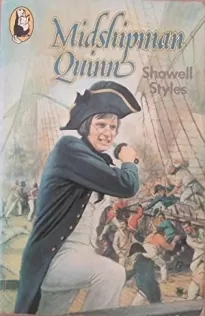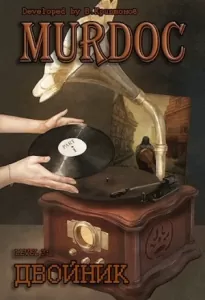Midshipman Quinn

- Автор: Showell Styles
- Жанр: Исторические приключения / Морские приключения
- Дата выхода: 1956
Читать книгу "Midshipman Quinn"
NOCK TWICE
The Rector's impulse was to burst into the room at once, but experience of his nephew's arrangements made him more prudent. He "no eked" twice, urgently. At once the door opened as though by some magic agency, letting out a concentrated waft of the smell which had previously annoyed them. The Reverend Theophilus clapped his handkerchief over his nose.
"Septibus!" he roared. "Cub here ibbediately!"
A small figure standing by a littered table at the far end of the room turned calmly at the words, loosing the cord which by a neat arrangement of pulleys and loops had released the catch of the door.
"Yes, Uncle," said Septimus Quinn obediently.
But it was typical of him that he went first to the window and threw it wide open to allow the fumes to escape. He was fifteen years of age but looked less because of his lack of height. He wore a pair of large steel-rimmed spectacles and his black hair was cut shorter than was the fashion of 1803, but the general effect of neatness was spoiled by a large black smudge which covered most of the lower half of his small pale face.
"Are you killed, my lamb?" demanded Mrs. Cattermole shrilly as he approached.
"Pray don't distress yourself, ma' am," returned Septimus gravely. "I am alive."
"And what was the cause of that—ah—explosion?" inquired the Rector sternly.
Septimus unhooked his spectacles and turned to his uncle with the air of a lecturer explaining something simply for the benefit of his audience.
"A little experiment, sir," he replied courteously. "It had occurred to me that if the substance known as Potassium Chlorate were to be contained in some small vessel with the right quantity of Sulphur, and the compound impacted-that is to say, if I hit it a pretty fair whack with a pestle — the result would be an expl—"
"Enough!" thundered the Reverend Theophilus, pointing to a door on the landing. "You will wash your face, sir, and then come to my study. I wish to have a talk with you."
Three minutes later Septimus Quinn presented himself in his uncle's study. He was washed and tidy but otherwise not perceptibly subdued. Indeed, as Mrs. Cattermole had discovered, it was practically impossible to subdue Septimus Quinn. The only sign that he was anticipating trouble was the fact that he was still wearing his steel-rimmed spectacles. Septimus had no real need of spectacles in the ordinary way, and wore them chiefly for reading or close work; he was exceptionally longsighted, and could follow the lofty flight of a skylark long after most people had lost sight of it. But he had a habit of carrying them about with him and putting them on whenever he was confronted with a problem. He said it helped him to think better.
The Reverend Theophilus was annoyed by this habit; it made his nephew look too old and wise for his years.
"Take those things off, boy," he snapped irritably, "and sit down there. "
"Very well, Uncle," said Septimus, obeying.
The Rector frowned at him in silence for a few moments. He was not an unkind man, but he found it quite impossible to understand Septimus. In the days when the Reverend Theophilus was young, boys had been boys. They ran races, played games, gave each other black eyes and gory noses, and never looked inside a book unless they had to. Septimus was quite different. He read every book he could lay hands on and seemed to be more interested in how a football was made than in kicking it. And he was for ever experimenting. Not for the first time, the Rector wondered what on earth would happen to Septimus when he was plunged into the career he was destined to follow.
"My boy," he said gravely, "I feel I am to blame. I should have had this talk with you long ago. I fear I have been too much occupied with my own work to give you the care I should have given. "
"Pray don't distress yourself, Uncle," replied Septimus with equal gravity. "You have been exceedingly kind."
It was one of Septimus's most irritating habits to tell people not to distress themselves, and the Reverend Theophilus felt some of his kindness evaporating.
"I cannot understand you," he went on rather more sharply than before. "For more than a year you have known what your career is to be. For the last two months you must have realised that any day might see you summoned to take your place in that calling. Yet what steps have you taken to prepare yourself for it?"
Septimus continued to regard him calmly in silence. He knew by now that his uncle required no reply to questions of this kind.
"Your activities during the time you have resided here," pursued the Rector, "have been remarkable only for their—ah—peculiarity. At present your time, and the pocket-money which your father directed should be paid to you, appear to be devoted to playing about with dangerous chemicals."
"Not dangerous, Uncle," observed Septimus mildly. "I took care to read Doctor Priestley's manual—"
"Do not interrupt me. Before that, you employed your leisure in acquiring the art of glass-blowing, in the course of which this house was twice nearly set on fire. Before that again, it was carpentry — a menial occupation for one of your birth. There was the disgraceful occasion — I trust you have not forgotten it, for I have not — when you went about this village and countryside in a succession of disguises, including" — the Reverend Theophilus snorted disgustedly — "including the disguise of a travelling juggler."
"It took a long time to learn all those tricks," nodded Septimus thoughtfully.
"Bah! What use will they be to you? And where was your dignity, sir? You seem to have no conception of what will be required of you in the near future, and it is my duty as your guardian-a duty which, perhaps, I have neglected-to enlighten you." The Rector placed the tips of his fingers together and settled himself in his chair. "I shall begin by drawing your attention to the perilous situation in which Britain finds herself at this time."
Septimus perceived that he was in for a long lecture. It was characteristic of him that he did not fidget or shuffle his feet. He was capable of remaining perfectly still for long periods; indeed, he had once tested himself, by way of experiment, and had succeeded in standing motionless for two hours and a quarter outside the Rectory toolshed.
"This country," began the Reverend Theophilus, "has been fighting the French for ten years. I do not count the few months of uneasy peace which ended last May. Napoleon Bonaparte has sworn to bring all Europe under his rule, and he has succeeded with every nation except one. Britain alone remains to defy him. At this moment a huge invasion army is gathered on the other side of the Channel, waiting to attack. In his armies Bonaparte has ten men to our one. You perceive that this country and people — including you and me, Septimus — are in the greatest danger."
He paused. Septimus knew all this well enough, but he went on listening politely with one ear. The other was cocked to listen to a sound from outside, the sound of cantering hooves approaching the Rectory; they seemed to have turned into the gate and now clattered to a standstill at the door.
"One thing only," resumed the Rector, "stands between Britain and her terrible foe — the British Navy. By God's grace our seamen and sea-officers are the finest the world has ever seen. That, Septimus, is why I am wondering how you, when the time comes, will—" He broke off as the housekeeper, after knocking at the study door, came in. "Well, Mrs. Cattermole?"
"The mail rider from Petersfield just brought this, sir," said Mrs. Cattermole, holding out a flat oblong package. "It's addressed to Master Septimus and marked 'Urgent', so thinking as perhaps I'd best bring it straight in—"
"Thank you, Mrs. Cattermole."
The Reverend Theophilus took the package and waited until she had gone out. Then he glanced at the heavy seal, imprinted on purple wax.
"I do believe," he said in some agitation, "that my instructive talk has come too late after all."
"As the package is addressed to me, Uncle, I'd better open it," suggested Septimus.
"Of course, my boy, of course."
Septimus slit the covering and took out a folded sheet of stiff paper. As he read its contents his small face gave no hint of the excitement he felt. At last he looked up.
It's from the Admiralty in London, Uncle," he said calmly. "It says that Mr. Septimus Quinn, hitherto borne on the books of His Majesty's ship Centurion, is transferred as Midshipman to His Majesty's frigate Althea — and is to report on board for immediate duty. "





